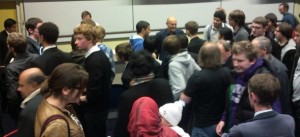As a result of change of speaker at a short notice, I will be speaking at Salford Astronomical Society’s annual Christmas lecture. This is a free talk and open to all members of the public.
The title is “Yuri Gagarin in Manchester“. This will be an early start to the 50th anniversary commemorations next year of Gagarin’s historic flight on 12th April 1961 and his visit three months later to Manchester on 12th July.
This talk is at 19:30 on Wednesday 15th December 2010 at the University of Salford.
Venue is lecture theatre room 115, Maxwell Building, University of Salford, The Crescent, Salford, M5 4WT. Map available here.

